Chinese Nationalist Party (KMT) lawmakers have proposed an amendment to the Act Governing Relations between the Peoples of the Taiwan Area and the Mainland Area (兩岸人民關係條例) that would allow mayors and county commissioners to visit China without seeking permission.
The proposal, initiated by KMT legislators Chu Fong-chi (朱鳳芝), Chang Ching-chung (張慶忠) and others, would also lift cross-strait travel restrictions on high-ranking public servants and police officers.
The Act requires senior public servants, senior police officers and officials of various agencies related to national security to apply with the Ministry of the Interior (MOI) for approval to travel to China.

PHOTO: GEORGE TSORNG, TAIPEI TIMES
It also requires mayors and commissioners to obtain approval from a committee of officials from the MOI, the Ministry of Justice (MOJ), the Mainland Affairs Council (MAC) and the National Security Bureau (NSB) before visiting China.
Chu said the restrictions make trips to China inconvenient and ineffective for mayors and county commissioners.
Mayors and county commissioners could promote Taiwan’s agricultural products, tourism, business and culture in China, she said, adding that their posts did not concern issues of national security.
The proposal says that only officials from the Ministry of National Defense, the NSB, the MOJ’s Investigation Bureau and public servants working with national security issues should be restricted from visiting China.
The legislature’s Internal Administration Committee is scheduled to review the amendment on Wednesday.
The Democratic Progressive Party (DPP) caucus said it opposed the amendment.
Senior officials could leak information on national security if they make frequent visits to China without restrictions, DPP caucus whip Lee Chun-yee (李俊毅) said.
Lee said that in a number of cases, government officials from various agencies had been charged with spying for China.
“The proposed amendment would hurt Taiwan’s national interests and put the county in danger,” Lee said. “Such an amendment is irresponsible because it was proposed without a thorough review of its potential impact on national security.”
In related news, former vice president Annette Lu (呂秀蓮) and Legislative Speaker Wang Jin-pyng (王金平) yesterday disagreed on communication between the KMT and the Chinese Communist Party (CCP).
While Lu said she was in favor of abolishing the party-to-party platform, Wang said it remained essential.
The two made the remarks at a fundraising event in Taipei.
Wang said the KMT and CCP had both been founded in China and had been at odds for a long time. Now they have begun interacting and set up a platform that serves as a buffer and a preliminary communication channel, he said.
Lu said she could not know whether any secret deals were being made between the KMT and CCP, but that the KMT could not represent the government or President Ma Ying-jeou (馬英九) in negotiating.

SHIPS, TRAINS AND AUTOMOBILES: The ministry has announced changes to varied transportation industries taking effect soon, with a number of effects for passengers Beginning next month, the post office is canceling signature upon delivery and written inquiry services for international registered small packets in accordance with the new policy of the Universal Postal Union, the Ministry of Transportation and Communications said yesterday. The new policy does not apply to packets that are to be delivered to China, the ministry said. Senders of international registered small packets would receive a NT$10 rebate on postage if the packets are sent from Jan. 1 to March 31, it added. The ministry said that three other policies are also scheduled to take effect next month. International cruise ship operators

HORROR STORIES: One victim recounted not realizing they had been stabbed and seeing people bleeding, while another recalled breaking down in tears after fleeing A man on Friday died after he tried to fight the knife-wielding suspect who went on a stabbing spree near two of Taipei’s busiest metro stations, Taipei Mayor Chiang Wan-an (蔣萬安) said. The 57-year-old man, identified by his family name, Yu (余), encountered the suspect at Exit M7 of Taipei Main Station and immediately tried to stop him, but was fatally wounded and later died, Chiang said, calling the incident “heartbreaking.” Yu’s family would receive at least NT$5 million (US$158,584) in compensation through the Taipei Rapid Transit Corp’s (TRTC) insurance coverage, he said after convening an emergency security response meeting yesterday morning. National

PLANNED: The suspect visited the crime scene before the killings, seeking information on how to access the roof, and had extensively researched a 2014 stabbing incident The suspect in a stabbing attack that killed three people and injured 11 in Taipei on Friday had planned the assault and set fires at other locations earlier in the day, law enforcement officials said yesterday. National Police Agency (NPA) Director-General Chang Jung-hsin (張榮興) said the suspect, a 27-year-old man named Chang Wen (張文), began the attacks at 3:40pm, first setting off smoke bombs on a road, damaging cars and motorbikes. Earlier, Chang Wen set fire to a rental room where he was staying on Gongyuan Road in Zhongzheng District (中正), Chang Jung-hsin said. The suspect later threw smoke grenades near two exits

Taiwan has overtaken South Korea this year in per capita income for the first time in 23 years, IMF data showed. Per capita income is a nation’s GDP divided by the total population, used to compare average wealth levels across countries. Taiwan also beat Japan this year on per capita income, after surpassing it for the first time last year, US magazine Newsweek reported yesterday. Across Asia, Taiwan ranked fourth for per capita income at US$37,827 this year due to sustained economic growth, the report said. In the top three spots were Singapore, Macau and Hong Kong, it said. South